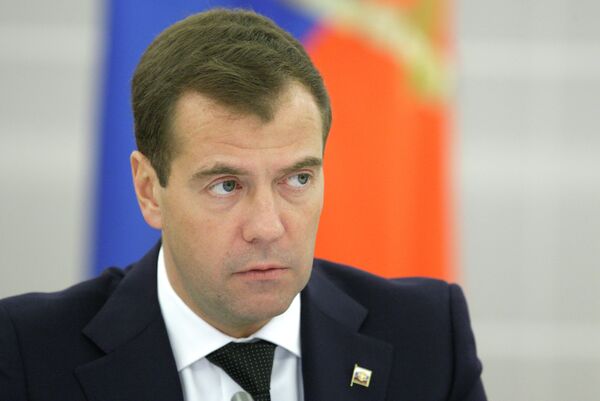President Medvedev has shown that the powers of the Russian head of state may extend to the most unexpected areas - for example, the realm of space and time. His decision to scrap the annual shift to daylight savings time in the autumn of 2011 is a natural continuation of an initiative to reduce the number of time zones in Russia.
Last year, five constituent entities of the Russian Federation "moved an hour closer" to Moscow, since they did not turn back the clock to daylight savings time with the rest of the country. The decision angered local residents in Kamchatka and the Samara Region - not immediately, but with the onset of winter, when it started to get dark too early. Several thousand people attended street protests in Petropavlovsk-Kamchatsky.
But now, after Medvedev announced that in October 2011 no clocks anywhere else would be turned back, these regional protesters, who had previously been disgruntled, expressed partial approval and satisfaction. However, this is just one small part of the issue. The president's decision was not made for individual regions and areas, but for the entire country.
"We will not shift to daylight savings time next autumn," Medvedev announced his decision. "We will lose an hour of sleep one last time this spring, but after that, the troubles will end. At the same time, we will have more daylight hours. I think it would be interesting for our country and more useful in general. In any case, people have asked me repeatedly to do this."
Well, the president has reiterated that government officials at all levels must listen to the public. So he listened and made the corresponding conclusions.
The decisiveness with which Medvedev abolished the use of daylight savings time in Russia seems unprecedented. Setting clocks back and forward has become commonplace in many countries that we are accustomed to calling civilized - at least those in North America and the European Union. Daylight savings time is considered to be economically justified and harmless in terms of health.
In Russia and the former USSR, however, there was no consensus on this among experts. The 1981 decision to adopt daylight savings time had an economic justification. And in this case, the adjective "economic" refers directly to two closely related meanings - the economy and economizing.
Some Russian scientists say that using daylight savings time results in a saving of at least 2.5 billion kilowatt-hours of electricity. In addition, the time change coincides with the start of work at many farms, the beginning and end of the heating season, the falling and rising of air temperature, and other household and industrial factors that affect electricity consumption.
But opponents of such a purely economic approach did not relent in all these years. They claimed that the current system of time shifts leads to disruption of the circadian rhythm, a vitally important and genetically regulated balance between waking and sleeping hours. The use of daylight savings time leads to a forced awakening an hour earlier for six months and an unnatural working rhythm for all of the autumn and winter months.
There is medical research that says that in the first five days after the clocks are turned back there is an 11% increase in the number of emergency calls from heart patients.
It is these human factors that Dmitry Medvedev took into account, saying, "The need to adapt causes unnecessary stress and aggravates illnesses."
Moreover, the energy savings should not be overestimated. Yes, after the clocks are turned back an hour, people turn off the lights in their homes earlier. But this is a drop in the ocean of electricity consumption. The lion's share of consumption is industry, which usually works around the clock, and one extra hour does not really matter.
So, if the time shift bothers some people, why not abolish it? Interestingly, however, it took thirty years to understand this simple truth.
The views expressed in this article are the author's and do not necessarily represent those of RIA Novosti.

